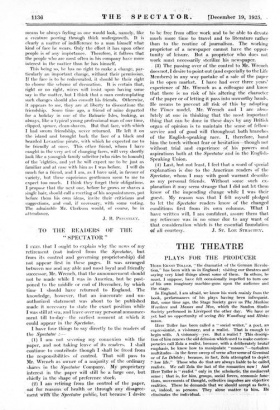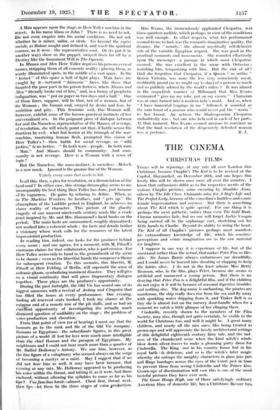THE THEATRE
PLAYS FOR -THE. PRODUCER HERR ERNST.TOLLER, "the dramatist of the German Revolu- tion," lias been with us in England ; visiting our theatres and saying very kind things about some of them. In others, he must, I suppose, have felt occasionally impelled to turn one of his own imaginary machine-guns upon the audience and
the stage. .
In England, I am afraid, we know his work mainly from the book, performances of his plays having been infrequent. But, some time ago, the Stage Society gave us The Machine Wreckers and Masses and Men, which the Sandon Studio Society performed in Liverpool the other day. We have as yet had no opportunity of seeing Die Wandlung. and Ifinke- Herr Toiler has been called a " social writer," a poet, an expressionist, a visionary, and a realist. That is enough to begin with. A visionary—yes. But a realist ? This descrip- tion of him renews the old delusion which used to make contem- poraries call Zola a realist, because, with a deliberately brutal' emphasis, he knew, how to manipulate "masses "—turbulent multitudes—in the fierce sweep of scene after scene Of Germinal or of La Dad& ; because, in fact, Zola attempted to depict low life." Those who do that are always liable to be called realists. We call Zola the last of the romantics now ! And Herr Toiler is " realist" only in the scholastic, the. mediaeval] sense ; that is, for him, groups, social forces, economic fuiic-; tions, movements of thought, collective impulses are objective realities. These he demands that we should accept as &di ;, OF, indeed, as persons; They alone matter to him. HO
eliminates the individual. - - - - - - - A Mari appears Upon the stage, as Herr Toiler saw him in the 'street. Is his name Hans or John ? There is no need to ask. Do not even enquire into his social condition. Do not ask whether he is miner, sailor, or clerk. Go beyond the espke sociale, as Balzac sought and defined it, and reach the spiritual essence, as it were—the representative soul. Or (to put it in another way) show us the puppet, swayed from far off by a Destiny like the Immanent Will in The Dynasts.
In Masses and Men Herr Toiler deprives his persons even of tiatnes,'Stripping them of all concrete reality ; placing theM, as ,Wanly- illuminated spots, in the middle cf a vast space. In the " kernel " of this space a ball of light plays. Wan faces arc caught by it—tortured " daimonic " faces, like those that haunted the poor poet in his prison fortress, where Masses and Men" literally broke out of him," and, in a frenzy of prophetic ;indignation, was " put on paper in two days and a half." One of these faces, suppose, will be that, not of a Woman, but of !the Woman ; the human soul, swayed by desire and fear, by ambition and pity. This feminine soul, this Woman will, tewever, exhibit some of the known practical instincts of her universalized sex. In the poignant piece of dialogue between her and the Nameless, representative of the Masses, of revenge, of revolution, she will wisely point out that, if battle across the frontiers be evil—what but horror at the triumph of the war- .machine, mastering human flesh, prompted this vision of Herr Toiler's ?—then battle for social revenge, or " wild justice," is no better. " In both wars—people. In both wars —Man." And Masses should be community. And com- a-malty is not revenge. Here is a Woman with a sense of logic !
. But the Nameless, the mass-instinct, is merciless—Moloch in a new mask. Ignored is the gnomic line of the Woman, Unholy every cause that needs to kill.
Is all this, then, a plea for revolution, or a denunciation of the :herd-soul ? In either case, this strange dream-play seems to me 'incomparably the best thing Herr Toiler has done, just because of its vagueness. He gains by refusing to define. When, as in The Machine Wreckers, he localizes, and " gets up " the !atmosphere of the Luddite period in England, he achieves no closer reality of character. This picture of the ghastly tragedy of our nascent nineteenth century reads like a crude pact inspired by Mr. and Mrs. Hammond's lucid books on the period. The main facts are summarized, roughly dramatized ; not worked into a coherent whole ; for facts and details bother a visionary whose work calls for the resources of the latest impressionist production.
In reading him, indeed, one looks for the producer behind every scene ; and one agrees, for a moment, with M. Pitoeff's enormous claims for that collaborator, who is part creator. For Herr Toiler seems only to hand us the groundwork of the scene to be shown ; even as the librettist hands the composer a theme for subsequent creation. To this scenario, this libretto, M. Pitoeff or Herr Fehling, of Berlin, will superadd the sense of :,volcanic gloom, symbolizing imminent disaster. They will give us a visual continuity that will piece fragmentary dialogue 'together. These plays are the producer's opportunity.
During the past fortnight, the Old Vie has scored one of its .biggest successes with a revival of Antony and Cleopatra that has filled the house at every performance. One evening, fending, all reserved seats booked, I took my chance at the extreme end of a remote row of the pit stalls, and so had an e*Mnt opportunity of investigating the actually much dismissed question of audibility on the stage ; the problem of voice-production and elocution. From that point of view (or of hearing) I must say that the honours go to the rank and file of the Old Vic company. Romans or Egyptians—the subordinate figures, in this great picture of a world ill lost for love were much more intelligible than the chief Roman and the paragon of Egyptians. My neighbours and I could not hear much more than a quarter of Mr. Balliol Holloway's Antony. We saw him,_ however, as the fine figure of a voluptuary who seemed always-on the verge of becoming a martyr or a saint. May I suggest that if we did not hear him as well, it may have been because, that 'evening at any rate, Mr. Holloway appeared to be producing voice within the throat, and letting it, as it were, boil there enclosed, without allowing the syllables to come so far as his slips? Vox faucthus WWI—almost. Chest first, throat next, 'then lips—let these be the three stages of voice production.
- Miss Evans, the tremendously 'applauded. Cleopatra, was three-quarters audible, which perhaps, in view of the conditions was well enough. In other respects, what her performance seemed to me to lack was the romantic-imaginative quality, the dreamy, the " moody," the almost mystically self-delusive side of the variable Egyptian serpent. She was good in the practical moments and movements. She rounded effectively upon the messenger—a passage in which most Cleopatras succeed. She was excellent in the scene with Octavius ; watching him, temporizing with him. But the end of all ! Had she forgotten that Cleopatra, if a Queen " so unlike " Queen Victoria, was none the less very consciously royal, snobbishly proud (as we might say to-day) of a person so much and so publicly adored by the world's rulers ? It was almost in the coquettish manner of Millamant that Miss Evans murmured " give me my robe, put on my crown." Charmian was at once turned into a modern lady's maid. And so, when " I have immortal longings in me " followed, it sounded as the vain boast of a poseuse who would never put the " worm " to her breast. An actress the Shakespearian Cleopatra undoubtedly was ; but one who believed in each of her parts. At that moment, Miss Evans seemed anxious to convince us that the final resolution of the desperately defeated woman















































 Previous page
Previous page